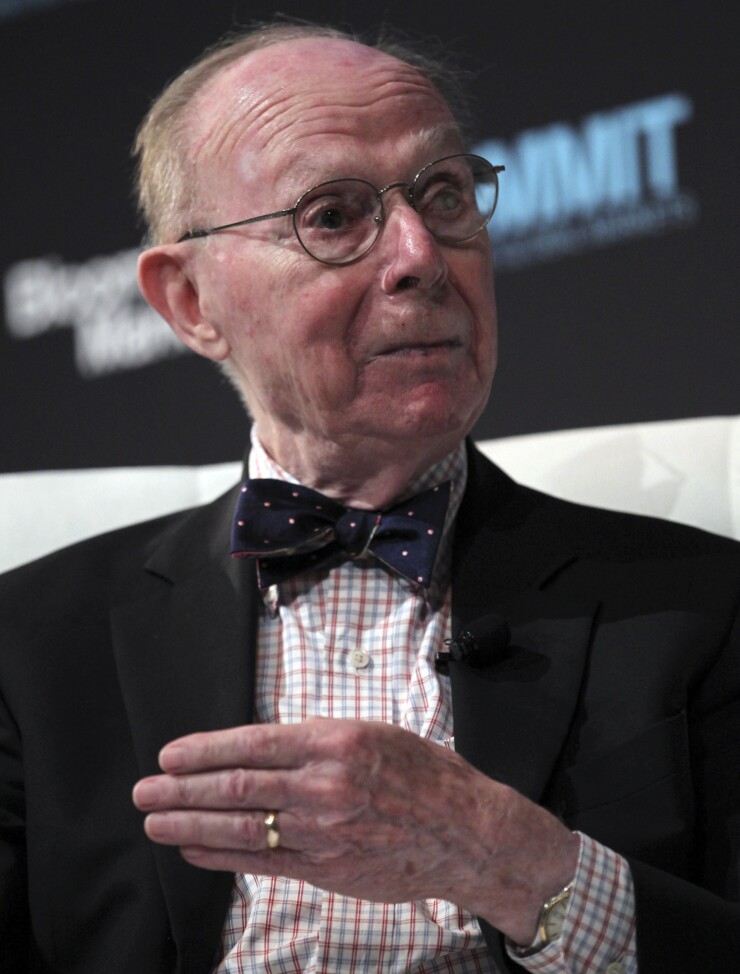Allan Meltzer, an economist and Federal Reserve historian who was critical of the central bank’s recent policies, died on Monday at the age of 89, according to Carnegie Mellon University, where he was a professor of political economy.
A monetary policy expert who consulted with congressional committees and central banks, Meltzer brought historical perspective and a sharp knowledge of past policy foibles to his commentary. In addition to writing a multi-volume history of the Fed, he was known for a review of the international financial institutions that proposed reforms in 2000 of the World Bank and International Monetary Fund.
“Allan Meltzer was one of the greatest economists of the 20th century,” Marvin Goodfriend, a professor at Carnegie Mellon’s Tepper School of Business, said in an interview Tuesday. “His path-breaking scientific work and effective advocacy revolutionized the theory and practice of central banking, and helped end the Great Inflation in the United States and around the world in the 1980s.”

With Professor Karl Brunner of the University of Rochester, Meltzer co-founded the Shadow Open Market Committee in 1973, a group of economists that began to analyze monetary policy just as inflation started to soar in the U.S. Meltzer’s stature made him a fearless critic of Fed chairs.
In March last year, he criticized the central bank for buying housing assets during the financial crisis. The Fed currently holds $1.77 trillion of mortgage-backed securities even while housing finance is now functioning.
He called the downgrading of money growth in the Fed’s economic analysis “a huge error.”
“The Federal Reserve should end its fascination with interest rates and aim at medium-term targets for money and credit,” he wrote on the Hoover Institution’s website in March last year. “The policy that worked so well for Paul Volcker is far better than the replacement Bernanke and Yellen chose,” he said, referring to the current Fed chair and her predecessor.
Meltzer said in an interview in 2008 that while Alan Greenspan was a “great Fed chairman,” he erred in ignoring warnings about the risks of keeping rates low during the housing boom.
“He lets himself off much too easy,” Meltzer said, adding that he told Greenspan at the time that he was exaggerating the danger of deflation and thus making a mistake in cutting interest rates to 1 percent. The Fed cut its benchmark rate to a 45-year low of 1 percent in June 2003, held it there for a year, then raised it only gradually, in quarter-percentage-point increments.
“He always believed that the Federal Reserve was much more of a political animal than he would have liked” and therefore should be more constrained, said former St. Louis Fed President William Poole, who called Meltzer a mentor and a “genuinely nice person.”
Recently, Meltzer had been sharply critical of the Fed’s ultra-loose monetary policy, saying in 2009 it would generate inflation higher than the double-digit levels in the 1970s. Since then, inflation has averaged 1.3 percent.
IMF ReformAfter a series of IMF bailouts to countries including Thailand to Brazil in the 1990s, a U.S. congressional panel was convened to study whether the international financial institutions were operating beyond their mandates.
The 11-member Meltzer Commission called for sweeping reform, urging the fund to end low-interest loans to poor nations, limit lending terms to four months or less and charge interest above market rates. The report reflected a philosophy he espoused during the latter years of his career: a dislike of bailouts.
After the Treasury Department issued a rebuttal of his report, Meltzer responded with his trademark frankness. “The administration wants to keep the IMF as a slush fund so the Treasury can dump taxpayer money in places like Russia and Indonesia,” he said.
The spirit of Meltzer’s recommendations were later taken up by officials in the George W. Bush administration. Stanford economist John Taylor, for one, pushed for tougher limits on IMF lending during his tenure as the Treasury undersecretary for international affairs from 2001 to 2005.





